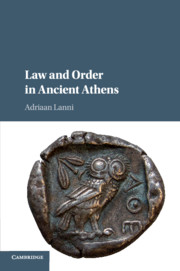TWO - Law Enforcement and Its Limits
from PART ONE
Published online by Cambridge University Press: 05 August 2016
Summary
What role did straightforward deterrence play in maintaining order in Athens? That is, did the imposition of penalties in court cases induce compliance with the norms expressed in Athenian statutes? We will see that the Athenians’ reliance on private initiative to enforce the law resulted in sporadic enforcement, particularly with respect to victimless crimes. Moreover, Athenian courts did not predictably and reliably apply the statute under which a given case was brought. This uncertainty regarding prosecution, trial outcomes, and enforcement of judgments must have weakened the deterrent effect of Athenian statutes. At the same time, the Athenians provided special mechanisms to ensure more straightforward enforcement of laws in a few circumstances: selected market and shipping transactions, and offenses that threatened public order, including certain theft-related offenses and threats to the state. In this way, Athens ensured a minimum level of public order and economic security, making it possible for order to be maintained despite a more limited formal coercive apparatus in the rest of the system.
The Underenforcement of Athenian Statutes
Fear of statutory penalties undoubtedly played a role in inducing compliance with statutory norms. Indeed, Athenian court speakers, particularly prosecutors urging a conviction, often suggest that legal penalties deter wrongdoers. But the sporadic and unpredictable enforcement of statutes must have weakened incentives to comply in some situations. Classic deterrence theory typically considers deterrence a function of the certainty of punishment and the severity of the sanction. Modern legal theorists have pointed out that a high risk of conviction has a much stronger effect on deterrence than the severity of the penalty. We will see that the absence of public prosecutors and the reliance in most cases on private initiative for prosecution and enforcement of judgments resulted in underenforcement of statutes, particularly in the case of “victimless” public offenses. By lowering the probability of punishment, the reliance on private initiative reduced deterrence. Moreover, the vagueness of Athenian statutes, absence of binding precedents, and broad notion of relevance meant that while Athenian courts enforced general norms of fairness and good citizenship, they did not reliably and predictably enforce the legal norms expressed in statutes. The broad uncertainty regarding trial outcomes also reduced the deterrent effect of statutes.
- Type
- Chapter
- Information
- Law and Order in Ancient Athens , pp. 47 - 74Publisher: Cambridge University PressPrint publication year: 2016



